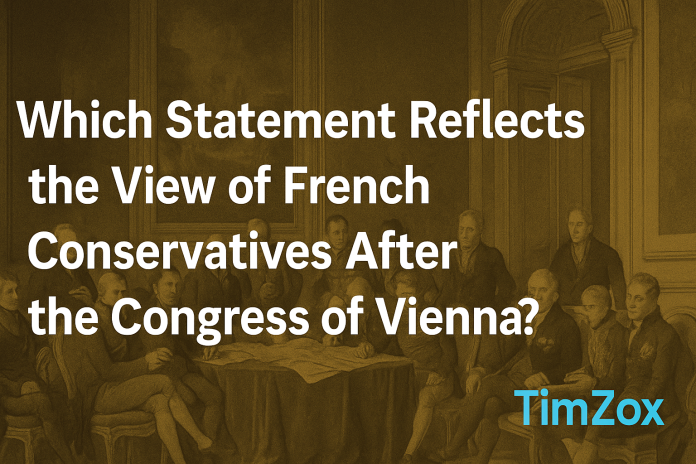The Congress of Vienna (1814–1815) was a critical turning point in European history, representing a concerted effort by major powers to restructure Europe and secure peace after decades of turmoil from the French Revolution and Napoleonic Wars. Central to this restructuring was the ideological position taken by French conservatives, who ardently advocated for restoring and preserving traditional political and social structures. A deeper understanding of French conservatives’ viewpoints after the Congress necessitates exploring their foundational beliefs, enacted policies, social ideals, and political practices in the post-Vienna period.
This expanded examination aims to thoroughly detail French conservatives’ emphasis on political legitimacy, social hierarchy, and vehement resistance to revolutionary and liberal ideals.
Historical Background
The Congress of Vienna was convened following Napoleon’s decisive defeat at Waterloo to reestablish the traditional European political order disrupted by revolution and imperial ambitions. European leaders, most notably Klemens von Metternich of Austria, aimed to reinstate hereditary monarchies, reassert aristocratic privileges, and stabilize Europe’s geopolitical landscape.
France, having been central to revolutionary upheavals, became a focal point for restoring stability. Louis XVIII’s ascension marked the Bourbon Restoration, which French conservatives, particularly the influential Ultra-Royalists, viewed as a necessary restoration of monarchical legitimacy over revolutionary chaos.
Core Beliefs of French Conservatives
1. Principle of Legitimacy
At the heart of conservative ideology lay the principle of legitimacy, prominently championed by Metternich during the Congress of Vienna. This doctrine posited that hereditary monarchies provided rightful governance, vital for political stability and societal order.
French conservatives fervently supported the Bourbon monarchy’s restoration under Louis XVIII, perceiving him as a symbol of continuity with France’s historic past, thereby reinforcing monarchical authority as the legitimate and divinely sanctioned governing structure.
2. Social Hierarchy and Aristocratic Privilege
French conservatives actively sought to restore pre-revolutionary social hierarchies, prioritizing the nobility and the Catholic Church as indispensable elements of societal stability. They perceived the revolution as a destructive force that undermined essential societal structures.
Concrete policy measures, such as indemnifying aristocratic émigrés for properties lost during revolutionary seizures and elevating the Catholic Church’s social and political influence, underscored their commitment to hierarchical restoration. This policy approach aimed to reassert traditional authority figures’ dominance and counteract revolutionary egalitarianism.
3. Opposition to Revolutionary Ideals
French conservatives vehemently opposed revolutionary ideals of liberty, equality, and fraternity, labeling these concepts as dangerous sources of disorder. They attributed France’s political instability and social disruptions to the spread of revolutionary ideologies, which they believed needed stringent control and suppression.
Consequently, they advocated policies designed to limit political freedoms, curtail popular political participation, and suppress liberal and revolutionary movements that threatened the established social order.
Which Statement Best Reflects French Conservatives’ View?
The statement best encapsulating the French conservatives’ viewpoint post-Congress of Vienna is:
“France must be governed by its legitimate Bourbon king, supported by the Church and aristocracy, with strict limits on popular participation in politics.”
This statement articulates core conservative priorities:
- Re-establishing monarchical legitimacy
- Restoring social hierarchies and aristocratic privileges
- Limiting democratic reforms and restricting liberal political activism
Conservative Policies in Post-Vienna France
Under the Bourbon Restoration, particularly during Louis XVIII’s (1814–1824) and Charles X’s (1824–1830) reigns, conservative policies became clearly manifest:
The Charter of 1814
Louis XVIII enacted the Charter of 1814, which created a constitutional monarchy but limited political participation. The Charter restricted suffrage primarily to wealthier social classes, ensuring that political power remained in conservative, aristocratic hands. Although the Charter nominally guaranteed certain civil liberties, monarchical power and aristocratic dominance remained paramount.
The Chambre Introuvable (1815–1816)
The 1815 elections ushered in the Chambre Introuvable, a parliament dominated by Ultra-Royalists who fervently pursued policies to dismantle revolutionary reforms, restore aristocratic privileges, and amplify the Catholic Church’s influence.
The White Terror
In a reactionary backlash termed the White Terror, conservatives targeted revolutionaries and liberals in violent reprisals during 1815. These actions highlighted the Ultra-Royalists’ resolve to eliminate revolutionary sentiments and restore conservative dominance.
Consequences and Legacy
Immediate impacts of conservative policies were significant:
- Restoration of monarchical authority, aristocratic privileges, and ecclesiastical power
- Authoritarian consolidation of governance
- Active suppression of democratic principles and revolutionary ideals
However, such extreme conservative actions generated significant political backlash among liberals, middle-class professionals, and moderate royalists. Accumulated tensions led directly to the July Revolution of 1830, toppling Charles X and ending reactionary Bourbon rule.
The broader legacy of conservative policies included:
- Establishing frameworks for constitutional monarchy that balanced traditional governance with limited liberal reforms
- Influencing conservative political doctrines throughout Europe in subsequent decades
- Contributing to cycles of revolution and reaction, culminating in revolutions across Europe in 1848
Expert Insights
Historians François Furet and Simon Schama have critically assessed French conservative policies, arguing these policies fundamentally misjudged the revolution’s permanent societal changes. Schama emphasizes that the conservatives’ attempts to reconstruct the Ancien Régime failed precisely because they neglected transformative changes embedded within French society.
FAQs
Did all French conservatives support absolute monarchy?
No. While Ultra-Royalists favored absolute monarchy, a moderate conservative faction known as “Doctrinaires” advocated constitutional monarchy, blending monarchical governance with limited liberal policies to sustain political stability.
Was the Charter of 1814 democratic?
Not genuinely democratic. Although it guaranteed civil liberties, voting rights were strictly limited to the wealthy, maintaining aristocratic and conservative control.
Why did the Bourbon Restoration ultimately fail?
The Restoration failed primarily due to hardline conservative policies provoking widespread opposition, alienating critical segments of society, and disregarding the irreversible societal transformations triggered by the revolution.
Read Also: Finance www Disquantified.org: Demystifying Finance for Everyone
Conclusion
French conservatives after the Congress of Vienna adhered strongly to restoring traditional monarchical rule, reinforcing social hierarchies, and suppressing revolutionary ideals. Their political approach profoundly influenced France’s post-Napoleonic trajectory, shaping European conservative thought for decades. Nevertheless, their inability to adapt to changing societal realities ultimately precipitated their downfall, underscoring the limited efficacy of reactionary policies amid profound social transformations.


